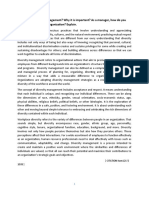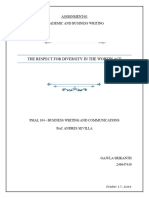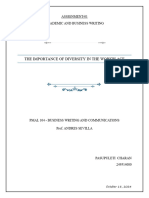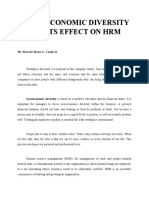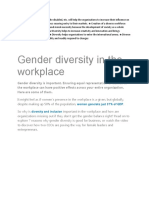ELEC 1 Case 2
ELEC 1 Case 2
Uploaded by
Scott AlilayCopyright:
Available Formats
ELEC 1 Case 2
ELEC 1 Case 2
Uploaded by
Scott AlilayOriginal Title
Copyright
Available Formats
Share this document
Did you find this document useful?
Is this content inappropriate?
Copyright:
Available Formats
ELEC 1 Case 2
ELEC 1 Case 2
Uploaded by
Scott AlilayCopyright:
Available Formats
Name: Mary Rose T.
Laureano BSA ELEC 1
Chapter 2: Workplace Diversity
Dealing with Being Different
In this era, diverse organizations are inherently happier, more productive, and more
competitive in their industries. As business entities become more diverse, it becomes
increasingly important for them to recognize and handle that diversity. Diversity in the
workplace is important because when you respect the employees in your company, they work
harder, and many companies don't know that. A diverse workplace tries to create a welcoming
environment where everyone's skills are valued and used. From my point of view, managing a
diverse workforce means that the leaders and managers of a company are responsible for getting
a better diverse workforce.
To deal with workplace diversity, first is to invest in building effective relationships.
According to the Gallup organization, “People who have a best friend at work are seven times
more likely to be engaged in their jobs”. Coworkers will feel more comfortable speaking
opinions, brainstorming, and supporting new ideas if they're comfortable together. Change,
creativity, and innovation require this level of teamwork. Group happiness and efficiency rise
when employees see this collaboration's successes.
Second, choosing your mentor carefully. The article advises against seeking mentorship
from someone like oneself and instead suggests seeking assistance from more experienced and
educated mentors, regardless of demographics. Mentors like this might offer career advice and
insights into the company's culture.
Following, investigate company resources. Inclusion may be described as the experience
that people have in the workplace and the degree to which they feel appreciated for who they are,
the skills and experience they contribute, and the degree to which they have a strong feeling of
belonging with others at work. Included can also refer to the extent to which people feel valued
for the abilities and experience they bring to the workplace.
Lastly, we should know our rights as an individual. Diversity is directly correlated to
increased levels of production and collaboration. The establishment of an affectionate
appreciation and admiration for the unique characteristics possessed by each individual
contributes to the formation of a working environment that is more receptive, open, and
accommodating, and in which every member of the workforce believes they are in a position to
make a contribution. The revenues of the organization, the productivity of the employees, and
the engagement of the workforce can all significantly benefit from effective diversity
management.
In order to effectively manage diversity in the workplace, it is necessary to acknowledge
the singular experiences ideas opinions held by each individual and to capitalize on the resulting
strengths. This results in the company outperforming the competition and attracting applicants
with a greater level of quality.
You might also like
- Corporate and Business Law (LW) - EnglishDocument16 pagesCorporate and Business Law (LW) - EnglishEnkhbold Damdinsuren100% (1)
- Culture AuditDocument9 pagesCulture AuditRaviNo ratings yet
- Concept Note For Trade FairDocument5 pagesConcept Note For Trade FairRalph Aldrin F. VallesterosNo ratings yet
- Food Delivery Platforms in Southeast Asia - MW - Jan 2022Document36 pagesFood Delivery Platforms in Southeast Asia - MW - Jan 2022Mochamad Arifin ZainulNo ratings yet
- HRM Chapter 4 Job Analysis PDFDocument45 pagesHRM Chapter 4 Job Analysis PDFAbdul GaffarNo ratings yet
- Madayag-Laarni Grace - Final ExaminationDocument12 pagesMadayag-Laarni Grace - Final ExaminationLaarni Grace MadayagNo ratings yet
- Week 12 NotesDocument4 pagesWeek 12 NotesSaeed Ahmed ChacharNo ratings yet
- Module 4 Policy BriefDocument6 pagesModule 4 Policy Briefapi-726385417No ratings yet
- Equality and Diversity Assignment TwoDocument7 pagesEquality and Diversity Assignment TwoLusa Mulonga JkrNo ratings yet
- Managing Diversity at WorkplaceDocument7 pagesManaging Diversity at WorkplaceSolomon PriceNo ratings yet
- HRM (Diversity Management)Document8 pagesHRM (Diversity Management)Vikram SahaNo ratings yet
- Business Writing Assignment - Importance of Diversity in WorkplaceDocument8 pagesBusiness Writing Assignment - Importance of Diversity in WorkplaceAneena S NathNo ratings yet
- Assignment 1 PmalDocument6 pagesAssignment 1 PmalcatchmeifyoucanraNo ratings yet
- MeshDocument30 pagesMeshPooja PatelNo ratings yet
- What Is Organizational Diversity?Document8 pagesWhat Is Organizational Diversity?khurram riazNo ratings yet
- Charan PMALDocument6 pagesCharan PMALcatchmeifyoucanraNo ratings yet
- Flores, Diversity in Workplace, Why CareDocument6 pagesFlores, Diversity in Workplace, Why Careyffdz4mvvcNo ratings yet
- Diversity in The WorkforceDocument3 pagesDiversity in The WorkforceScribdTranslationsNo ratings yet
- Workplace Diversity Vivek PDFDocument20 pagesWorkplace Diversity Vivek PDFVivek rathodNo ratings yet
- Diveristy Benefits and Challenges PDFDocument3 pagesDiveristy Benefits and Challenges PDFWako FredrickNo ratings yet
- Diversity in BusinessDocument19 pagesDiversity in Businesssong neeNo ratings yet
- Assignment I - Challenges of Organizational BehaviorDocument11 pagesAssignment I - Challenges of Organizational BehaviortawfikNo ratings yet
- The Conference Board Udemy Business Effective Leadership in A Hybrid World of Work FinalDocument31 pagesThe Conference Board Udemy Business Effective Leadership in A Hybrid World of Work FinalRohit DasNo ratings yet
- 设计工作的未来(英)Document52 pages设计工作的未来(英)Amber ChiuNo ratings yet
- Ob Q1Document1 pageOb Q1sadaf mumtazNo ratings yet
- How To Create An Inclusive Work Environment - NicoleDocument8 pagesHow To Create An Inclusive Work Environment - NicoleNicole Chimwamafuku100% (1)
- Socio Economic Diversity and Its Effect On HRMDocument3 pagesSocio Economic Diversity and Its Effect On HRMKim Joyce Pantanoza AlimorongNo ratings yet
- HRM Workplace DiversityDocument36 pagesHRM Workplace DiversityNeha Gulati100% (3)
- Diversity Equity and Inclusion (DEI) in LeadershipDocument8 pagesDiversity Equity and Inclusion (DEI) in LeadershipRukhshinda100% (1)
- Position PaperDocument4 pagesPosition PapergajelesangelcaneteNo ratings yet
- Workforce Diversity Management: Biggest Challenge or Opportunity For 21st Century OrganizationsDocument6 pagesWorkforce Diversity Management: Biggest Challenge or Opportunity For 21st Century Organizationsderrel251706No ratings yet
- Ii-Steps To Manage Diversity in WorkplaceDocument9 pagesIi-Steps To Manage Diversity in WorkplaceHakim Alami OuahabiNo ratings yet
- What Is Affective Events Theory (AET)Document7 pagesWhat Is Affective Events Theory (AET)Sadia FahadNo ratings yet
- Developing People and Organizations: Becoming An Employer of ChoiceDocument9 pagesDeveloping People and Organizations: Becoming An Employer of ChoiceSabita HusniaNo ratings yet
- Diversity in OrganizationsDocument3 pagesDiversity in Organizationshanlinn.epNo ratings yet
- The Difference Between Diversity and Inclusion, and Why It MattersDocument4 pagesThe Difference Between Diversity and Inclusion, and Why It Mattersashutosh_parida_5No ratings yet
- Management - Quiz 2Document5 pagesManagement - Quiz 2Charlou CalipayanNo ratings yet
- Gender Diversity in The WorkplaceDocument9 pagesGender Diversity in The WorkplaceperryNo ratings yet
- Diversity ManagementDocument5 pagesDiversity ManagementMehedi KhanNo ratings yet
- Diversity Without InclusionDocument2 pagesDiversity Without InclusionArushiNo ratings yet
- Assignment # 8.Document6 pagesAssignment # 8.Ruby EstacioNo ratings yet
- II. Diversity in Organizations: The 4 Types of DiversityDocument6 pagesII. Diversity in Organizations: The 4 Types of DiversityStephany AlcansadoNo ratings yet
- ConclusionDocument2 pagesConclusionMayar WalidNo ratings yet
- Hbo Report On DiversityDocument28 pagesHbo Report On DiversityjhaysonbagaoiNo ratings yet
- 4444Document1 page4444Bayu Aji PrasetyoNo ratings yet
- The Seven Characteristics of Successful Company CulturesDocument5 pagesThe Seven Characteristics of Successful Company CulturessandeepNo ratings yet
- 9 Indicators of A Healthy Company CultureDocument9 pages9 Indicators of A Healthy Company CulturesinergiselarasacademyNo ratings yet
- Lo SCDocument2 pagesLo SCKath DOANo ratings yet
- Proposal To Address Workplace Inclusion IssuesDocument9 pagesProposal To Address Workplace Inclusion Issuesnesto3737No ratings yet
- October 2015 1446891355 02Document3 pagesOctober 2015 1446891355 02SonuNo ratings yet
- Presented By-B.S.Dipa, (Assistant Professor) Visiting Faculty School of Open LearningDocument24 pagesPresented By-B.S.Dipa, (Assistant Professor) Visiting Faculty School of Open Learningmopid68742No ratings yet
- Academic and Business Writing FinalDocument7 pagesAcademic and Business Writing FinalBhatia SimerNo ratings yet
- Diversity Vs InclusionDocument7 pagesDiversity Vs InclusionlamaroquinasNo ratings yet
- Student I.D: 392056Document8 pagesStudent I.D: 392056Oyedele AjagbeNo ratings yet
- LAUS, Justine Aaron F.Document15 pagesLAUS, Justine Aaron F.Justine Aaron LausNo ratings yet
- Diversity - More Than A NotionDocument4 pagesDiversity - More Than A NotionLinda BurrsNo ratings yet
- Business Ethics: "Workplace Diversity"Document5 pagesBusiness Ethics: "Workplace Diversity"Sneha SinhaNo ratings yet
- DHR Group Work 2Document9 pagesDHR Group Work 2Rashid De RadianceNo ratings yet
- RAK 7 Steps To Create Kindness in The WorkplaceDocument9 pagesRAK 7 Steps To Create Kindness in The Workplace9s897xt5zbNo ratings yet
- Answer: Workforce Diversity Is A Characteristic That Makes People Different From OneDocument3 pagesAnswer: Workforce Diversity Is A Characteristic That Makes People Different From OneNarinderNo ratings yet
- Southeast AsiaDocument21 pagesSoutheast AsiarubillosjohnpaulNo ratings yet
- The Importance of Diversity in WorkplaceDocument2 pagesThe Importance of Diversity in WorkplaceNavjot Singh RaiNo ratings yet
- 1 Assignment - Individual Excellence and Social Dynamics CMPLTDocument3 pages1 Assignment - Individual Excellence and Social Dynamics CMPLTMarkNo ratings yet
- The Inclusive Leader: Embracing Diversity for Organizational ExcellenceFrom EverandThe Inclusive Leader: Embracing Diversity for Organizational ExcellenceNo ratings yet
- Income TaxationDocument9 pagesIncome TaxationScott AlilayNo ratings yet
- Intro To Financial ManagementDocument14 pagesIntro To Financial ManagementScott AlilayNo ratings yet
- Archinext Design Entry 1Document4 pagesArchinext Design Entry 1Scott AlilayNo ratings yet
- Title Defense Presentation SampleDocument18 pagesTitle Defense Presentation SampleScott AlilayNo ratings yet
- Elec 1 Case 2Document1 pageElec 1 Case 2Scott AlilayNo ratings yet
- Notre Dame of Dadiangas University: Marist Avenue, General Santos CityDocument2 pagesNotre Dame of Dadiangas University: Marist Avenue, General Santos CityScott AlilayNo ratings yet
- Review of The Related LiteratureDocument11 pagesReview of The Related LiteratureScott AlilayNo ratings yet
- Barangay ApopongDocument99 pagesBarangay ApopongScott Alilay100% (1)
- UntitledDocument2 pagesUntitledScott AlilayNo ratings yet
- A2 Alilay, ScottDocument3 pagesA2 Alilay, ScottScott AlilayNo ratings yet
- Jungie Mari S. Cumla Notre Dame of Dadiangas University Inc. Proposed One-Storey Residential Building APR. 24,2023 CS 402Document2 pagesJungie Mari S. Cumla Notre Dame of Dadiangas University Inc. Proposed One-Storey Residential Building APR. 24,2023 CS 402Scott AlilayNo ratings yet
- Legal Eats 4 HandbookDocument76 pagesLegal Eats 4 HandbookThe Sustainable Economies Law CenterNo ratings yet
- Change Readiness Assessment (CRA) : What Is It?Document9 pagesChange Readiness Assessment (CRA) : What Is It?Nevets NonnacNo ratings yet
- DP 14554Document45 pagesDP 14554Divino EntertainmentNo ratings yet
- GTAG 17 Auditing IT Governance 2012Document24 pagesGTAG 17 Auditing IT Governance 2012hb1No ratings yet
- Production and Operations Management - Introduction (BSBA)Document48 pagesProduction and Operations Management - Introduction (BSBA)hanna sanchezNo ratings yet
- Intro To Tax ManagementDocument55 pagesIntro To Tax ManagementJam HailNo ratings yet
- Corporate Culture and Its Connection With ExternalDocument21 pagesCorporate Culture and Its Connection With ExternalHari PrasathNo ratings yet
- Ch01 Harrison 8e GE SMDocument63 pagesCh01 Harrison 8e GE SMMuh BilalNo ratings yet
- 978 981 10 8848 3 - 62 PDFDocument8 pages978 981 10 8848 3 - 62 PDFArsal MudassarNo ratings yet
- Sseagt 1 Aw Final Low en (2) Tcm78-355169 SCANIADocument17 pagesSseagt 1 Aw Final Low en (2) Tcm78-355169 SCANIAVinay TigerNo ratings yet
- Random Account LedgerDocument5 pagesRandom Account LedgerAri SchwartzNo ratings yet
- Lathian Soal CH 5 Kelompok 7 P5-3Document2 pagesLathian Soal CH 5 Kelompok 7 P5-3Ashdh100% (1)
- Intercompany Inventory TransfersDocument31 pagesIntercompany Inventory TransfersAudrey Louelle100% (2)
- PFA PROJECT ReportDocument26 pagesPFA PROJECT ReportPragyaNo ratings yet
- Declaration and Payment On DividendDocument12 pagesDeclaration and Payment On DividendChiranjeev Routray100% (1)
- Financial Performance Analysis OF Standard Chartered Bank Nepal LTDDocument48 pagesFinancial Performance Analysis OF Standard Chartered Bank Nepal LTDMEEN MAGARNo ratings yet
- Finance Manager CVDocument2 pagesFinance Manager CVnabeel_gondal001No ratings yet
- Organizational Development Interventions To Solve Performance Management ChallengesDocument18 pagesOrganizational Development Interventions To Solve Performance Management ChallengesChandra sekhar VallepuNo ratings yet
- Corporate and Business Law (English) : Monday 9 June 2014Document4 pagesCorporate and Business Law (English) : Monday 9 June 2014dude devilNo ratings yet
- Godley2021 Article TheComplementarityPerspectiveTDocument16 pagesGodley2021 Article TheComplementarityPerspectiveTului5325No ratings yet
- Analyzing A CompanyDocument10 pagesAnalyzing A CompanyMars MaguenNo ratings yet
- Exemptions To Private Companies 05062015Document2 pagesExemptions To Private Companies 05062015Murali Mohana Rao PNo ratings yet
- Aniya 4-5Document6 pagesAniya 4-5Clyde ThomasNo ratings yet
- The Effect of Internal Audit On Organizational Performance: An Empirical Exploration of Selected Jordanian BanksDocument8 pagesThe Effect of Internal Audit On Organizational Performance: An Empirical Exploration of Selected Jordanian BanksFermwellNo ratings yet
- Supply Chain Management Logistics Multimodal Transportation OverviewDocument25 pagesSupply Chain Management Logistics Multimodal Transportation OverviewgizzillaNo ratings yet
- 4 Operations Management PERT CPMDocument323 pages4 Operations Management PERT CPMawaisjinnahNo ratings yet










